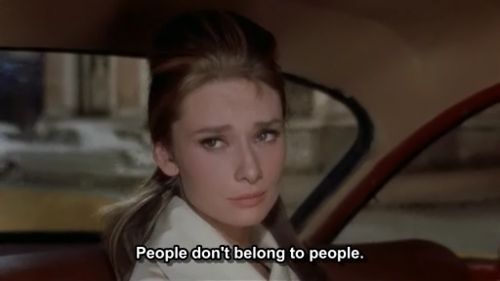
It’s the age-old question. But what’s the answer?
Aside from the basics, I think most people would have pretty varied answers. The reason I decided to write a post on this was because of something someone said the other day that actually (gasp!) elicited a reaction from me.
I think people often mistake my pragmatism as apathy. If I’m being honest, I don’t join in on a whole lot of discussions because I don’t see the point in arguing over little things. Aside from the rare occasion I’ve encountered a wholly racist, bigoted, or otherwise intolerant person, not much can really rile me up. I’m happy to listen to most opinions with an open mind and, most of the time, I can see where the other person is coming from even if their viewpoint is the polar opposite of mine.
That said, say something like “Love is supposed to be crazy!” and I’ll give you a piece of my mind.
No, it’s not. I will stand by this forever. I think that there is very little anyone (including me) can know everything about, and that you can always learn more, but I know this. It is absolutely not supposed to be crazy, and you will find there are very few things I’ll fight tooth and nail on, but for the things I do believe in I will. Not because I want to be right (which I think is an important distinction between those argue for self-satisfaction vs. those who don’t), but because I don’t want people to go through life with a seriously disturbed mentality about something that could greatly affect their health, as well as the health of others. Especially those they might inflict this mentality on—you know what they say: hurt people hurt people. If you’re f*cked up, don’t f*ck someone else up, is the nicest way I can put it.
So no, love is not supposed to be crazy. It is not supposed to “make” people crazy (take responsibility) and, the very worst, it is not a justification for bad behavior, selfishness, and/or a lack of self-control. Love is many things, but it is not obsession, possession, jealousy, self-righteousness, power struggles, and so on and so forth.
Now that we’ve established what love isn’t, what is it?
Again, I’ve probably barely scratched the surface of it, but this is what I’ve learned (and believe in) at least:
You can’t have love without trust and respect.
Right off the bat, I believe there is no relationship (a healthy one, anyways) that exists without these two crucial tenets. You have to trust your partner. Yeah, yeah, I know, you’ve been hurt in the past, whether it was a lying/cheating partner or another traumatic event. But I absolutely believe it’s everyone’s responsibility to deal with these experiences to ensure you don’t take out your insecurities on a new person. And another thing is that it’s totally fine to feel insecurities, because who doesn’t? What matters is how you respond to these feelings (not just react), then how you express them.
I have definitely felt scared, worried, or jealous before too. I’ve found that most people jump to conclusions because it’s the easiest solution. Like, if I think this happened, then that’s definitely what’s happened. What people also fail to remember is that your mind is actually capable of making up, well, pretty much anything. So take a minute and really think about it: What, exactly, is upsetting me? Should this really upset me? And whether it’s yes or no, why do you feel this way? Most of the time, you’ll find that there is actually nothing to worry about in reality—it’s your fears or insecurities making you feel this way. So then what do you do? Once you figure out the root of it, I find it’s a lot easier to deal with it. But if it’s something that still bothers you, you should definitely enlist your partner’s help. What works in one relationship might be different in another though—so you need to respect that they might not have the same solution as you, and that’s where compromise comes in. Each party has the right to see things the way they do, but if you truly respect your partner you will want to work together to find a solution that suits both of you. That’s what being a partner is all about—not just “getting your way,” or “being right,” and definitely not “you’re wrong, and there’s no other way but mine.” We all had different life paths, so some of us will be more independent vs. dependent, more accustomed to hashing out conflict once things cool down vs. in the heat of the moment, etc. Your partner isn’t necessarily wrong, they’re different. If you can’t understand that, at the very least, you probably have some work to do in understand yourself and other people before you commit to a long-term relationship.
Don’t start going through your partner’s phone at every opportunity you get, preemptively accuse them of them of cheating (and treat them as such), and kick off a whole lot of unhealthy relationship habits that could ruin your relationship beyond disrepair. You would think most people would get that, but you will get the select few who claim “love makes you crazy,” and that’s why they did all those things.
For the hundredth time, no. You make you crazy.
It does not matter what you say, if you don’t treat your partner with respect, that isn’t love.
There are a million other things that love is, which include patience, kindness, and hard work, among others, but I think that in general, you can boil it down to having trust and respect present in your relationship. After all, if you respect your partner, you will be kind to them as a result. A third factor essential to a healthy relationship could also be consistency, but I think that if you have respect for your partner, it also translates to being consistent. If you respect your partner, you will keep your promises and strive to maintain your relationship over time. That doesn’t mean we don’t slip up, but it means that those moments are exceptions rather than the rule. If you consistently make promises you don’t keep, it’s not a mistake after the third time (and some might even say the second). Every time, you have an opportunity to act differently.
Another statement I’ve heard before, similar to the one I mentioned above, is that love hurts. That, it is also not supposed to do. People get swept up in nonsense about love being this intensely passionate wild ride, with explosive fights and make-up sessions, but I think a real relationship is actually a lot more boring, in the best way possible. Sure, you will probably still get hurt (even by the person you end up with forever), but love is not supposed to be encapsulated by pain. There’s a difference between getting hurt (e.g. your partner says something insensitive about something that you’re insecure about or snaps at you on a bad day), and then there’s the kind of hurt that comes from intentional and/or immature actions that directly cause another person pain—particularly if it’s repeated.
If you’re not ready for a relationship, please don’t do that to another person. Don’t rush into a relationship and say things you don’t know that you properly mean yet. Don’t convince a person to fall if you’re not really sure you can catch them, and didn’t even bother putting a safety net in place first. There is no such thing as you meet a person and voila! Because they’re “the one,” it’s magic and you don’t have to grow, or make uncomfortable changes, or ever become better. You should always be working to make yourself better, whether you’re with or without someone.
Last but not least: The most important love you’ll ever have is for yourself—it sounds terribly lame and cliché, but it’s true. Don’t ever let anyone take that away from you.



